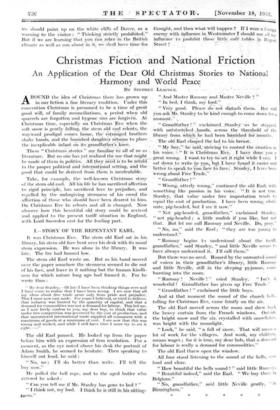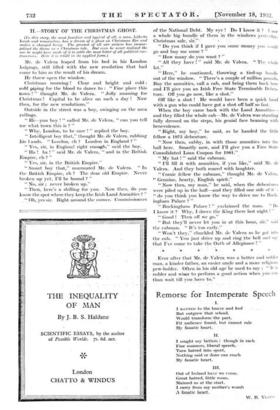Christmas Fiction and National Friction
An Application, of the Dear Old Christmas Stories- to National Harmony and World Peace • BY STEPHEN LEI:COCK.
AROUND the idea of .Christmas there has grown up in our fiction a fine literary tradition. Under this convention Christmas is presumed. to be atime of great good will, of family reconciliations, a period when old quarrels are forgotteri and bygone sins are forgiven. At Christmas time, especially on Cliristmas."Eve when the soft snow is gently falling, the stern' old earl relents, the . .
wayward prodigal comes home, the estranged_ brothers shake hands, and the banished .darightWr'e' turns to place the inexplicable infant rin its grandfather's • knee. .
These "Christmas stories" are ,familiar to all of us as literature. But no one has yet realized the use that might he made of them in politics. All theyneed is to be refold'.
in the proper political and-interriational-setting, and the _ . .
good that could be derived from .them is incalculable: • Take, for example, the well-known Christmas story of the stern old earl. All his life he has sacrificed affection to rigid principle, has sacrificed love to prejudice, and repelled by the unforgiving sternness of his creed the affection of those who shoold have-been dearest td him. On Christmas Eve he relents and all is changed. Now observe how this beautiful old story could be revived and applied to the present tariff situation in England, with Lord Snowden cast for the leading part.
I.—STORY OF THE REPENTANT EARL.
It was Christmas Eve. The stern old Earl sat in his library, his stern old face bent over his desk with its usual stern expression. He was alone in the library.. It was late. The fire had burned low.
The stern old Earl wrote on. But as his hand moved over the paper somehow the sternness seemed to die out of his face, and leave in it nothing but the human kindli- ness for which nature long ago had framed it. For he wrote thus :
" My dear Stanley,—Of lato I have been thinking things over and I have come to realize that I have been wrong. I see now that all my ideas about free trade arose only from pride and prejudice. This I must now cast aside. For years I believed, or tried to believe, that industry was limited by the quantity of capital, and that a demand for commodities was not a demand for labour. This led me, as I now freely confess to you, my dear boy, to think that value under free competition was governed by the cost of production, and that unrestricted international trade supplied all consumers with a maximum of goods at a minimum of cost. I see now that this was wrong and wicked, and while I still have time I must try to set it right "
The old Earl paused. He looked up from the paper before hiin with an expression of firm resolution. For a moment, as the eye rioted above his desk the portrait of Adam Smith, he seemed to hesitate.- Then speaking to himself out loud, he said : "No, no ; I'll do better than write. I'll tell the boy now."
He pulled the bell rope, and to the aged butler who entered he asked : "Can you tell me if Mr. Stanley has gone to bed ? " "I think not my lord. I think he is still in his sitting- room." . "And Master Ramsay and Master Neville? . "In bed, I think, my krd." . _ .
"Very good. Please do not disturb them. But ivill You ask Mr. Stanley to be kind enough to come down for a moment." - " Grandfather ! exclainied Stanley. -'ris he stepped, with . . outstretched ,handli across the threshold of the library from inch lie had been banished for -months. The old_Earl clasped the lad_ to his °breast.
" My -IsOy,". he said striving to control the Onotion in ' his voice...." It is Christmas Eve. • I hav'e done you IL . .
great_wrong. _1.-Want. to try to .set it-right While I can. I sat dowri to _write to vOul_ but _I have fsamd it easier and better to speak to,You:faCeto face„' Stanley, I haVe been wrong. about Free Trade."..
Grandfather !'" • "Wrong, utterly wrong," continued the old Earl; with Something like passion in his Voice: "It is not true, StanleY, that value'. under . free' importation tends ta equal the cost of produetion. I have been wrong, obsti- nate, pig-headed, but I see it now."
"Not pig-headed, grandfather," exclaimed Stanley, "not pig-headed ; a little mulish if you like, but not that. But let me call Ramsay and Neville. Do, pray."
"No, no," said the Earl ; "they arc too young to understand." - " Rairisay begins to understand about the tariff, grandfather," said Stanley, "and little Neville seems to have always understood it. I'll call them."
But there was no need. Roused by the unwonted sound of voices in their grandfather's library, little Ramsay and little Neville, still in the sleeping -pyjamas, came bursting into the room.
" Ramsay ! Neville ! " cried Stanley. "Isn't it wonderful ! Grandfather has given up Free Trade."
" Grandfather ! " exclaimed the little boys.
And at that moment the sound of the church hell;, tolling for Christmas Eve, came faintly on the air.
The old Earl moved across the room and drew back the heavy curtain from the French windows. Outside the bright snow and the air,' erystalled with snowflakes, was bright with the moonlight, " Look," he said, "'a fall of snow. That will mean a lot of work for the villagers. And work, my children, means wages ; for it is true, my dear lads, that a demand for labour is really a demand for commodities."
The old Earl threw open the window.
All four stood listening to the sound of the bells, now loud and clear.
"How beautiful the bells sound ! said little Ramsay. "Beautiful indeed," said the Earl. "We buy them in Belgium."
"No, grandfather," said little Neville gently, "iii Birmingham." II.—STORY OF THE CHRISTMAS GHOST.
(In this story, the most familiar and typical of all, a man, hitherto harsh and remorseless, has a dream of a ghost on Christmas Eve and wakes a changed being. The greatest of all our writers has immor- talized the theme as a Christmas tale. But even he never realized the use he might have made of it to settle the most bitter of all political con- troversies. Here it is retold in its applied form.) Mr. de Valera leaped from his bed in his London lodgings, still filled with the new resolution that had come to him as the result of his dream.
He threw open the window.
Christmas morning ! Clear and bright and cold : cold piping for the blood to dance to : "Fine place this town ! " thought Mr. de Valera. "Jolly morning for Christmas ! Capital to be alive on such a day ! Now then, for the new resolutions."
Outside in the street was a boy, swinging on the area railings.
"Hi—you boy ! " called Mr. de Valera, "can you tell me what town this is ? "
"Why, London, to be sure ! " replied the boy. - "Intelligent boy that," thought Mr. de Valera, rubbing his lands. "London, eh ? London in England ?." "Yes, sir, in England right enough," said the boy. "Ha ! ha ! " said Mr. de Valera, "and in the British Empire, eh ? " • " Yes, sir, in the British Empire."
"Smart boy that," murmured Mr. de Valera. "In the British Empire, eh ? The dear old Empire. Never broken up yet, I'll be bound ? " .
"No, sir ; never broken up."
"Then, here's a shilling for you. Now then, -do you know the spot where they keep the Irish Land Annuities ? " "Oh, yes sir. Right around the corner. Commissioners My t h12'e- meye! in the i° windows dows st e: vrdosaladv‘dv. aof whole bigNational Debt.bundle of f Christmas _sale; _ "Do' you think if I gave you some money yo?u go and buy me some ? "
"How- many do you want ?
"All they have ! " said Mr. de Valera. "The whole Jot."
"Here," he continued, throwing a _tied-up bundle out of the window. "There's a couple of million pounds. Buy the annuities, call a cab, and bring them back here and I'll give you an Irish Free State Terminable Deben- ture. Off you go now, like a shot."
Off like a shot ! He would have been a quick hand with a gun who could have got a shot off half so fast.
When the boy came back with the Land Annuities—. and they filled the whole cab—Mr. de Valera was standing fully dressed on the steps, his genial face beaming with benevolence.
"Right, my boy," he said, as he handed the little fellow a 1975 debenture.
"Now then, cabby, in with those annuities into the hall here. Smartly now, and I'll give you a Free State Consolidated ',Orin Coupon for 1981."
"My hat ! " said the cabman': . . "I'll fill it with annuities, if you like," said Mr. de Valera. And they both roared with laughter. • "Comic fellow the cabman," thought Mr. de Valera. "Genuine, hearty, English spirit."
"Now then, my man," he said, when the debentures were piled up in the hall—and they filled one side of it- " do you think you know the way to drive. me to Buck- ingham Palace ? "
"Buckingham Palace ! " exclaimed the man. "Do I know it ? Why, I drove the King there last night ! " " Good ! Then off we go."
"But they'll never let you in at this hour, sir." said the cabman. "It's too early."
"Won't they," *chuckled Mr. de Valera as he got into • the cab; "You just-drive up and ring the bell and say that TVe come to take the Oath of Allegiance ! "

































































 Previous page
Previous page